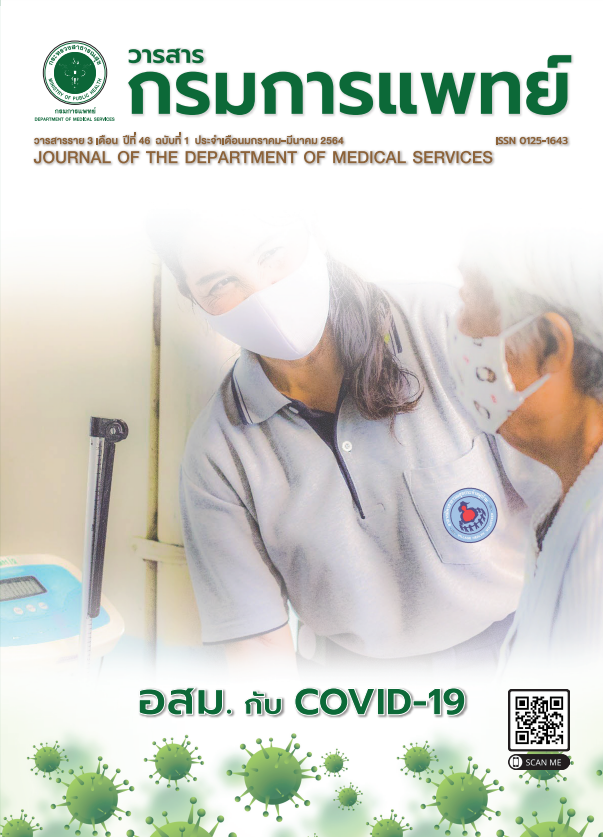Prognostic Factors and Overall Survival of Advanced Stage NSCLC Patients in Saraburi Hospital
Keywords:
Non-small cell lung cancer, Advanced stage, SurvivalAbstract
Background : Incidence and mortality of lung cancer are increasing. However, factors associating with survival is limited.
Objectives : This study aimed to analyze prognostic factors and overall survival of patients who were diagnosed and treated at Saraburi Hospital.
Methods : All 205 patients diagnosed with non-small cell lung cancer (NSCLC) stage 4 were recruited between 1st January 2013 and 31st December 2018. This retrospectively collected cohort was investigated about factors indicating prognosis and overall survival using Cox proportional hazard model.
Results : Patients who were treated with an appropriated treatment having better survival three times over than those who were not. Delay interval time between first contact with a doctor and oncologists increased risk of mortality with a hazard ratio (HR) 1.02 (95% CI = 1.002, 1.030). Patients who were frail (ECOG 3-4) increased risk of death, compared to those who were well performance [HR 2.29 (95% CI = 1.31, 4.01)]. Also, a personal history of smoking associated with a higher risk of death than non-smokers [HR 3.01 (95% CI = 1.63, 5.53)]. The 1-yr overall survival (OS) reached 76.6% (95% CI = 68.8, 82.6) when patients received specific treatments. Compared to chemotherapy and best supportive care, targeted therapy provided best survival rate with 1-yr OS at 100% and 5-yr OS at 58%. Treatment with chemotherapy gave second best survival rates (1-yr OS 76.9% and 5-yr OS 26.2%).
Conclusions : Patients who received specific treatments gained better outcomes than those who did not. Prolonged waiting time to visiting an oncologist could have lessen survival. Poor performance status and history of smoking increased risk of death. Although, there were a limited number of patients who were treated with targeted therapy, the survival rate was the best compared to other treatments
References
Globocan. Lung Fact Sheet. Int Agency Res Cancer 2018; 876.
Virani S, Bilheem S, Chansaard W, Chitapanarux I, Daoprasert K, Khuanchana S, et al. National and subnational populationbased incidence of cancer in Thailand: assessing cancers with the highest burdens. Cancers (Basel)2017; 9:108.
National Cancer Institue. Hospital cancer registration B.E.2561.National Cancer Institue, Department of Medical Services. The Ministry of Public Health; 2019.
Cancer Tomorrow. IARC.[Internet] 2018.[cited 2019 Nov 20]. Available from:http://gco.iarc.fr/tomorrow/graphic-isotype?type=0&type_sex=0&mode=population&sex=0&populations=900&cancers=15&age_group=value&apc_male=0&a c_female=0&print=0.
Globocan. Thailand Cancer Fact Sheet. Int Agency Res Cancer2018; 957.
Stewart LA, Pignon JP. Chemotherapy in non-small cell lung cancer: A meta-analysis using updated data on individual patients from 52 randomised clinical trials. BMJ1995; 311:899–909.
Ciuleanu T, Brodowicz T, Zielinski C, Kim JH, Krzakowski M,Laack E, et al. Maintenance pemetrexed plus best supportive care versus placebo plus best supportive care for nonsmall-cell lung cancer: a randomised, double-blind, phase 3 study. Lancet 2009; 374: 1432-40.
Schiller JH, Harrington D, Belani CP, Langer C, Sandler A, Krook J,et al. Comparison of four chemotherapy regimens for advanced non-small-cell lung cancer. N Engl J Med2002; 346: 92–8.
Feng SH, Yang ST. The new 8th TNM staging system of lung cancer and its potential imaging interpretation pitfalls and limitationswith CT image demonstrations. Diagn Interv Radiol2019; 25:270–9.
TCB Report Online. Thai population cancer database.National Cancer Institute http://tcb.nci.go.th/CWEB/cwebBase.do?mode=initialApplication; 2020
StataCorp. Stata Statistical Software: Release 14; 2015.
Ruhe C. Estimating survival functions after stcox with time-varying coefficients. The Stata Journal2016; 16:867–79.
American Cancer Society. Cancer Facts & Figures 2020. Atlanta:American Cancer Society;2020.
Jensen AR, Mainz J, Overgaard J. Impact of delay on diagnosis and treatment of primary lung cancer. Acta Oncol2002; 41: 147–52.
Rapp E, Pater JL, Willan A, Cormier Y, Murray N, Evans WK, et al. Chemotherapy can prolong survival in patients with advanced non-small-cell lung cancer - Report of a Canadian multicenter randomized trial. J Clin Oncol1988; 6: 633–41.
Langer CJ, Leighton JC, Comis RL, O’ Dwyer PJ, McAleer CA,Bonjo CA, et al. Paclitaxel and carboplatin in combination in the treatment of advanced non-small-cell lung cancer: a phase II toxicity, response, and survival analysis. J Clin Oncol1995; 13:1860–70.
Mok TS, Wu YL, Thongprasert S, Yang CH, Chu DJ, Saijo N, et al. Gefitinib or carboplatin–paclitaxel in pulmonary adenocarcinoma. N Engl J Med2009; 361: 947–57.
Fukuoka M, Wu YL, Thongprasert S, Sunpaweravong P, Leong SS, Sriuranpong V, et al. Biomarker analyses and final overall survival results from a phase III, randomized, open-label,first-line study of gefitinib versus carboplatin/paclitaxel in clinically selected patients with advanced non - small-cell lung cancer in Asia (IPASS). J Clin Oncol2011; 29: 2866–74.
Kawaguchi T, Takada M, Kubo A, Matsumura A, Fukai S, Tamura A, et al. Performance status and smoking status are independent favorable prognostic factors for survival in non-small cell lung cancer: a comprehensive analysis of 26,957 patients with NSCLC.J Thorac Oncol2010; 5: 620–30.
Gritz ER, Toll BA, Warren GW. Tobacco use in the oncology setting:advancing clinical practice and research.Cancer Epidemiol Biomarkers Prev2014; 23: 3–9.
Molina JR, Yang P, Cassivi SD, Schild SE, Adjei AA. Non-small cell lung cancer: epidemiology, risk factors,treatment, and survivorship. Mayo Clin Proc2008; 83: 584–94.
Yang R, Cheung MC, Pedroso FE, Byrne MM, Koniaris LG, Zimmers TA, et al. Obesity and weight loss at presentation of lung cancer are associated with opposite effects on survival. J Surg Res2011;170: e75-83.
Nichols L, Saunders R, Knollmann FD. Causes of death of patients with lung cancer. Arch Pathol Lab Med2012;136: 1552–7.
Downloads
Published
How to Cite
Issue
Section
License

This work is licensed under a Creative Commons Attribution-NonCommercial-NoDerivatives 4.0 International License.
บทความที่ได้รับการตีพิมพ์เป็นลิขสิทธิ์ของกรมการแพทย์ กระทรวงสาธารณสุข
ข้อความและข้อคิดเห็นต่างๆ เป็นของผู้เขียนบทความ ไม่ใช่ความเห็นของกองบรรณาธิการหรือของวารสารกรมการแพทย์



